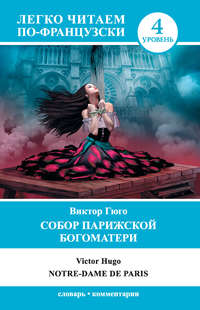
Полная версия
Собор Парижской богоматери / Notre-Dame de Paris
The young girl, stopped, breathless, and the people applauded her lovingly.
“Djali!” said the gypsy.
Then Gringoire saw a pretty little white goat come up to her.
“Djali!” said the dancer, “it is your turn.”
And, seating herself, she gracefully presented her tambourine to the goat.
“Djali,” she continued, “what month is this?”
The goat lifted its fore foot, and struck one blow upon the tambourine. It was the first month in the year, in fact.
“Djali,” pursued the young girl, turning her tambourine round, “what day of the month is this?”
Djali raised his little gilt hoof, and struck six blows on the tambourine.
The people were amazed.
“There’s sorcery at the bottom of it,” said a sinister voice in the crowd. It was that of the man, who never removed his eyes from the gypsy.
She continued to question her goat.
“Djali, what does Master Guichard Grand-Remy, captain of the pistoliers of the town do, at the procession of Candlemas?”
Djali reared himself on his hind legs, and began to bleat, marching along with so much dainty gravity, that the entire circle of spectators burst into a laugh at this parody of the interested devoutness of the captain of pistoliers.
The crowd applauded louder than ever.
“Sacrilege!” resumed the voice of the bald man.
The gypsy turned around.
“Ah!” said she, “’tis that villanous man!” Then she executed a pirouette on her heel, and set about[4] collecting in her tambourine the gifts of the multitude.
Money showered into it.
All at once, she passed in front of Gringoire. Gringoire put his hand into his pocket to find it empty. The pretty girl stood there, waiting.
An unexpected incident came to his rescue.
“Will you take yourself off, you Egyptian grasshopper?” cried a sharp voice.
The young girl turned round. It was no longer the voice of the bald man; it was the voice of a woman.
Gringoire had taken advantage of the dancer’s embarrassment to disappear.
It is an unpleasant thing to go to bed without supper, it is a still less pleasant thing not to eat and not to know where to sleep. That was Gringoire’s condition. No supper, no shelter.
This melancholy was absorbing him more and more, when a song suddenly tore him from it. It was the young gypsy who was singing.
Her voice was like her dancing, like her beauty. It was indefinable and charming. The words which she sang were in a tongue unknown to Gringoire. He felt the tears in his eyes. Her song breathed joy, most of all.
The same woman’s voice interrupted the song.
“Will you hold your tongue, you cricket of hell?” it cried, still from the same obscure corner of the place.
The poor “cricket” stopped short. Gringoire covered up his ears.
At this moment the attention has been diverted by the procession of the Pope of the Fools, which, after having traversed many streets and squares, came to the Place de Grève.
It is difficult to convey an idea of what Quasimodo had felt. It was the first enjoyment of self-love that he had ever experienced. To that day, he had known only humiliation, disdain, disgust.
At the very moment when Quasimodo was passing the Pillar House, a man darted from the crowd to tear from his hands, with a gesture of anger, his crosier of gilded wood – the emblem of his mock popeship.
This man was the man with the bald brow, who, a moment earlier, chilled the poor gypsy with his words of hatred. Gringoire, who had not noticed him up to that time, recognized him: “Hold!” he said. “’tis my master, Dom Claude Frollo, the archdeacon! What the devil does he want of that old one-eyed fellow?”
A cry of terror arose, in fact. Quasimodo threw himself from the plank. He leaped to the priest, looked at him, and fell upon his knees.
The priest tore off his tiara, broke his crozier, and rent his tinsel cope.
Quasimodo remained on his knees, with head bent and hands clasped. Then there was a strange dialogue of signs and gestures, for neither of them spoke.
The archdeacon gave Quasimodo a powerful shake, made him a sign to rise and follow him.
Quasimodo rose and walked in front of him.
Both were allowed to plunge into a dark and narrow street, where no one dared to go after them.
Chapter III
The Inconveniences of Following a Pretty Woman through the Streets in the Evening
Gringoire set out to follow the gypsy at all hazards. He had seen her, accompanied by her goat, take to the Rue de la Coutellerie.
“Why not?” he said to himself.
He walked along, very thoughtfully, behind the young girl. She hastened her pace and made her goat trot.
“After all,” he half thought to himself, “she must lodge somewhere; gypsies have kind hearts. Who knows?—”
The streets were becoming blacker and more deserted every moment. The curfew had sounded long ago. Gringoire had become involved, in his pursuit of the gypsy, in the labyrinth of alleys, squares, and closed courts.
The young girl’s attention had been attracted to him for the last few moments; she had repeatedly turned her head towards him with uneasiness.
He dropped his head, began to count the paving-stones, and tried to follow the young girl at a little greater distance, when, at the turn of a street, which had caused him to lose sight of her, he heard her utter a piercing cry.
He hastened his steps.
The street was full of shadows. Nevertheless, he saw the gypsy struggling in the arms of two men. The poor little goat, in great alarm, lowered his horns and bleated.
“Help! Gentlemen of the watch
Конец ознакомительного фрагмента.
Текст предоставлен ООО «ЛитРес».
Прочитайте эту книгу целиком, купив полную легальную версию на ЛитРес.
Безопасно оплатить книгу можно банковской картой Visa, MasterCard, Maestro, со счета мобильного телефона, с платежного терминала, в салоне МТС или Связной, через PayPal, WebMoney, Яндекс.Деньги, QIWI Кошелек, бонусными картами или другим удобным Вам способом.
Примечания
1
He’s asking alms! – Он просит милостыню!
2
Французский эквивалент “Hurrah”.
3
on the contrary – наоборот
4
set about – отправилась














